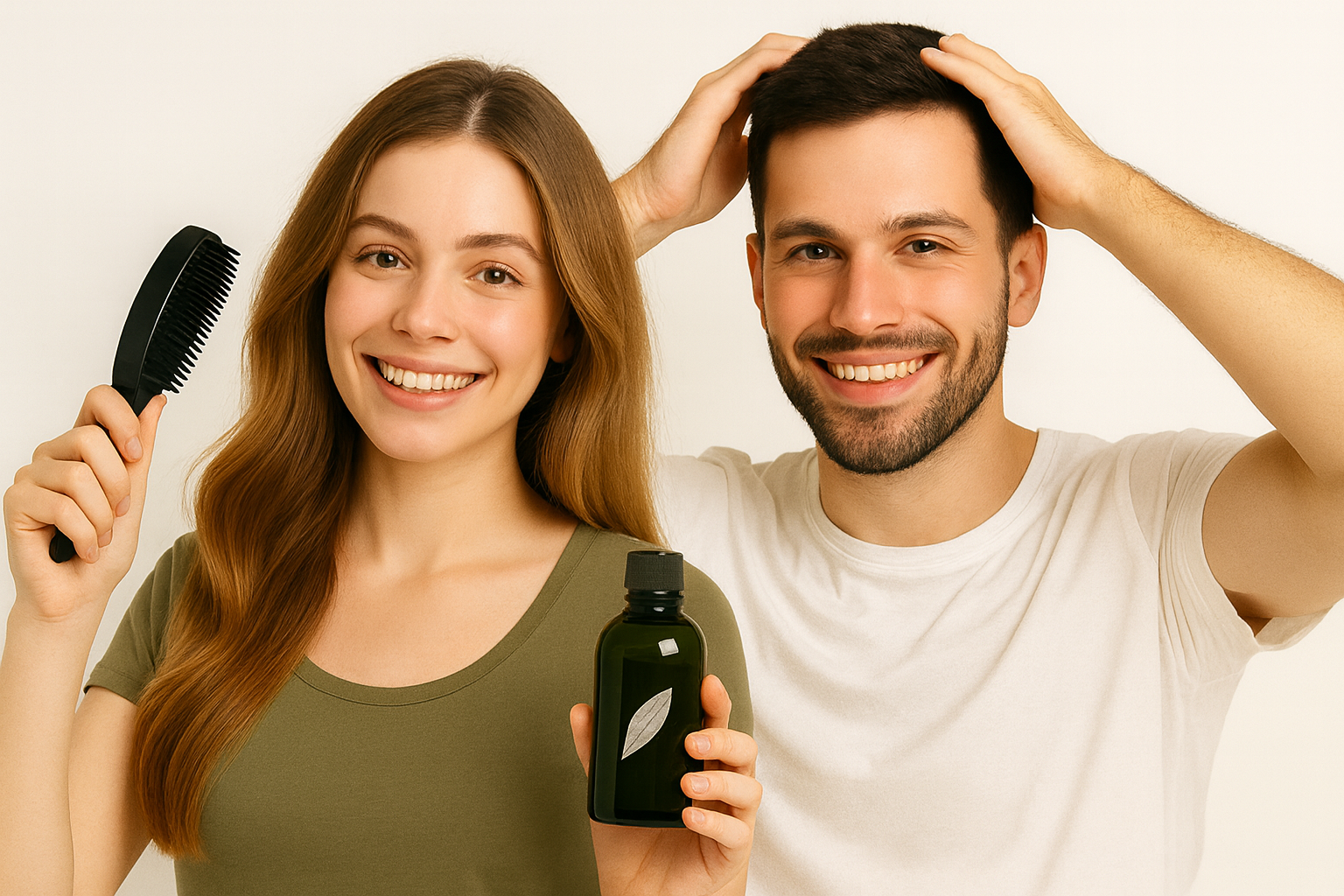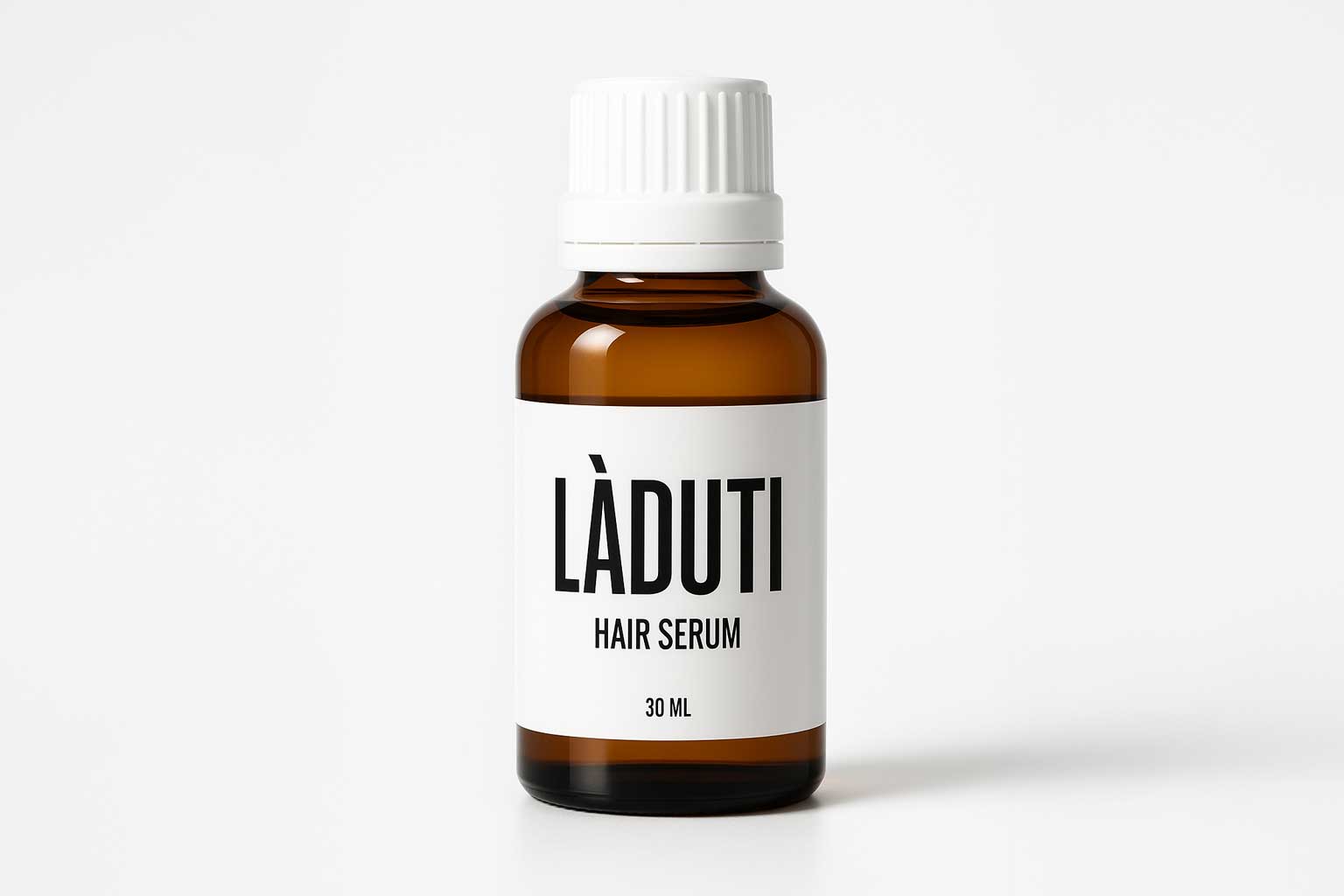Stimulate hair growth sustainably - here's how!

Hair loss and thinning hair are stressful for many people. However, there are ways to promote hair growth in the long term - without relying on quick but short-lived solutions. Sustainability here means supporting the health of the hair from the inside and outside in the long term.
1. causes of slowed hair growth
1.1 Genetic factors
Genetic predisposition is one of the most common causes of hair growth disorders. In androgenetic hair loss in particular, the hair follicles react sensitively to the hormone dihydrotestosterone (DHT). This shortens the growth phase of the hair so that it becomes thinner and falls out more quickly.
1.2 Nutrient deficiency
A lack of vitamins and minerals can significantly slow down hair growth. These are particularly important:
- Zinc → supports cell division in the hair roots
- Biotin → important for keratin formation
- Iron → promotes the oxygen supply to the hair follicles
Even slight deficiencies can worsen hair quality and promote diffuse hair loss.
1.3 Lifestyle
Stress, lack of sleep and an unhealthy diet have a direct impact on the scalp. Chronic stress in particular increases cortisol levels, which inhibits the supply of nutrients to the hair follicles. In combination with a lack of sleep and insufficient regeneration, hair growth slows down noticeably.
1.4 External influences
External factors can also weaken hair and slow down growth:
- Aggressive shampoos with sulphates or silicones
- Frequent dyeing or bleaching
- Heat styling with a hairdryer, straightener or curling iron
This stress leads to hair breakage, thinning ends and an overall unstable hair structure.

2. sustainable approaches to stimulate hair growth
2.1 Optimize nutrition
A balanced diet is the basis for strong hair growth. The following are recommended:
- Zinc-rich foods such as pumpkin seeds, oatmeal or lentils
- Biotin sources such as eggs, nuts and wholegrain products
- Iron sources such as pulses, spinach or red meat
Tip: A blood test by a doctor can help to identify deficiencies at an early stage and balance them out with targeted supplements.
2.2 Scalp care
Scalp massages
Regular scalp massages promote blood circulation and improve the supply to the hair roots. Just 5-10 minutes a day can make a difference.
Natural vegetable oils
Studies show that rosemary oil stimulates follicle activity and can have comparable effects to minoxidil - but without hormonal intervention. Oils such as jojoba or argan also moisturize and soothe the scalp.
2.3 Reduce stress
Relaxation techniques
Methods such as yoga, meditation or breathing exercises help to calm the autonomic nervous system and lower cortisol levels.
Sufficient sleep
Restful sleep is essential for the regeneration of the hair roots. Even small adjustments such as a regular sleep rhythm can bring noticeable improvements.
2.4 Gentle hair styling
Avoid stress
- No extreme temperatures during styling
- Less tight hairstyles (plaits, buns)
- Reduction of chemical treatments
Focus on care
- Mild shampoos without sulphates
- Moisturizing treatments for the lengths
- Heat protection sprays for unavoidable styling
2.5 Using high-quality hair serums
Effect of plant-based serums
Plant-based hair serums deliver targeted active ingredients to the hair roots without hormonal intervention. Ingredients such as are particularly effective:
- Caffeine → stimulates follicle activity
- Biotin → strengthens the hair structure
- Rosemary extract → promotes blood circulation
- Zinc → regulates the cell metabolism
Advantages over short-term solutions
In contrast to purely cosmetic products, high-quality serums have a long-term strengthening effect and can sustainably support hair growth - especially in combination with nutrition, stress reduction and scalp care.
Conclusion: Sustainably stimulating hair growth works with the right approach
If you want to stimulate hair growth in the long term, you should take a holistic approach. Only the combination of a healthy diet, gentle care, stress management and supporting active ingredients will lead to lasting results. Short-term solutions can help visually, but for strong and healthy hair in the long term, strengthening from the inside and outside is crucial, and modern hair serums can also provide useful support.
The Laduti Hair Serum starts right here: It combines a variety of high-quality, natural ingredients that have been scientifically studied in relation to hair and scalp health. Particularly noteworthy are:
- Caffeine: Stimulates the hair roots and can prolong the growth phase.
- Biotin: Supports keratin formation and contributes to stronger hair structures.
- Panax Ginseng: Promotes microcirculation and improves the supply of nutrients to the hair follicles.
- Rosemary oil: Stimulates blood circulation in the scalp and strengthens the activity of the hair roots.
- Centella Asiatica: Protects the scalp from oxidative stress and supports its regeneration.
- Procapil™An innovative active ingredient complex of oleanolic acid, apigenin and biotinoyl-GHK, which can improve hair anchoring and counteract hormone-induced hair loss.
- AnaGain™Active plant ingredient from pea sprouts that specifically activates the signaling pathways for hair growth and can help to prolong the hair growth phase.
The combination of these natural active ingredients and innovative complexes means that Laduti offers modern, gentle and long-term care that strengthens your scalp and can create and improve the conditions for healthy hair growth.

FAQ
How long does it take to see results?
As a rule, hair growth takes time. The first improvements are often visible after 3-4 months, as the hair cycle renews itself slowly.
Does biotin really help with hair growth?
Yes, biotin plays an important role in keratin production and can strengthen the hair structure. It has particularly good effects in combination with other nutrients.
Which home remedies stimulate hair growth?
Home remedies such as rosemary oil or aloe vera can support scalp care, but are no substitute for a balanced diet or well-founded care products.
Is hair growth genetically predetermined?
Yes, the genetic component is decisive. Nevertheless, diet, lifestyle and care can have a positive influence.
Can stress really cause hair loss?
Yes, chronic stress leads to hormonal changes and can trigger or increase diffuse hair loss. Reducing stress is therefore a key component for healthy hair.

